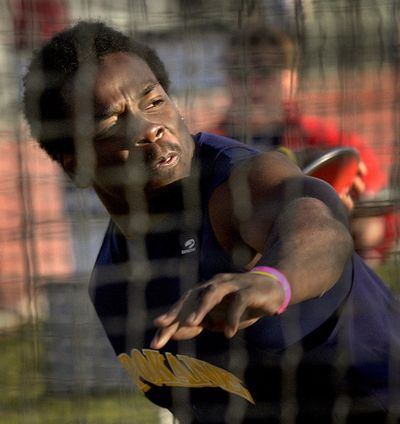Blanchette: Dixon enters Trials as hopeful unknown

Five-year-olds don’t bother setting ceilings on their imaginations.
So when Jason Dixon played his life out in his head, he’d shoot the moon. See UCLA play basketball on television and college became a notion. Shaq in an Orlando uniform made him think he’d get drafted by the Magic. The Dream Team. The Olympics.
“But I was going to be in the Olympics for basketball and track,” he remembered. “And being a little kid and not knowing how the Olympics really go, I thought I’d play a game of basketball, go to the track and then run back and play in the game again.”
And on the track? Well, he’d seen this logo – a man throwing a discus – on the tags of a popular brand of sweatshirts.
“I said, ‘I’m going to do that,’ ” he laughed. “I didn’t even know what it was. I didn’t find out until high school.”
High school for Jason Dixon – at Lewis and Clark – is now 10 years gone. The discus is still with him.
So is idea of the Olympics – which, at the moment, is all it has to be.
The trials to determine the United States track and field team to the 2012 Games begin today in Eugene – maybe the most democratic of all our sporting events. Show up on the appointed day and finish among the top three and you’re on the plane to London.
No phantom foul calls, no elastic strike zones, no Karolyis divvying up Olympic berths in the backroom. No appeals.
Favorites and long shots? Sure. But no one appreciates that one honest chance more than a long shot – and Dixon is that.
He didn’t get a Trials qualifying mark until only 12 days remained before last Sunday’s deadline. At one of those lower-than-low-key all-comers events at Spokane, Dixon horsed out the throw of his life – 197 feet, 10 inches.
“It just came to the point where I needed to quit trying to throw it,” Dixon said, “and just throw it.”
There are 15 qualifiers ahead of him who have bettered 200 feet – including the national leader, former Idaho thrower Russ Winger, and two-time Olympian Ian Waltz from Post Falls. It’s taken a throw of at least 205-7 to make the last two U.S. teams. And few expect Dixon to be among the serious contenders.
“Nationally,” he admitted, “nobody knows about me.”
Locally, well, those who know have to admire his resilience.
Dixon was just 11 months old when his father Perry died of kidney failure. His mother, Marjorie, choked in her sleep after an allergic reaction to medication when he was a high school freshman. After spending a year in Virginia with his sister, he returned to Spokane to live with his “pops,” Hal Lotzenhiser – though Dixon tends to think of the village as his family.
“Whether it’s family or a friend I’ve had for years or someone I met last week, I’ve always received a lot of encouragement here,” he said. “If you show them you have goals to move on somehow, they’re right there to say, ‘What can I do to help you?’ That’s just kind of Spokane.”
Two standout years at the Falls earned him a scholarship to Alabama – he took the letter to his mother’s gravesite a few days after it arrived, as she had repeatedly reinforced the goal of going to college. But upon graduation, he found himself like so many Olympic-sport athletes – on his own with bills to pay, trying to wedge training into a crowded list of priorities.
On Dixon’s list is his wife Jennifer and two young children, a job at the Davenport and a coaching gig at Gonzaga Prep – and so his situation is more extreme than the other Greater Spokane League alums he’ll see at the Trials.
U-Hi grad Brad Walker has been one of the world’s top pole vaulters for years, and is sponsored accordingly. Fellow LC grad Britney Henry has climbed among the nation’s top hammer throwers working out of the Olympic Training Center in Chula Vista, Calif., and another Tiger, javelin thrower Joe Zimmerman, is still at the University of Washington.
Dixon does have a sponsor, and a most apropos one at that – a screen printing outfit out of Seattle named Dark Horse.
“I kind of like that,” he said. “Nobody knows what I’m capable of, really. Every time I go to a meet somewhere, in front of a coach who’s never seen me before, he’ll say, ‘You could do this right now.’ Nobody really knows what can happen. Not having that spotlight can be a beautiful thing.
“It’s the Olympic Trials. It’s me and you and we’ll see how far we can throw this thing. It’s like when you’re kids, racing to the fire hydrant.”
That’s the idea, all right.